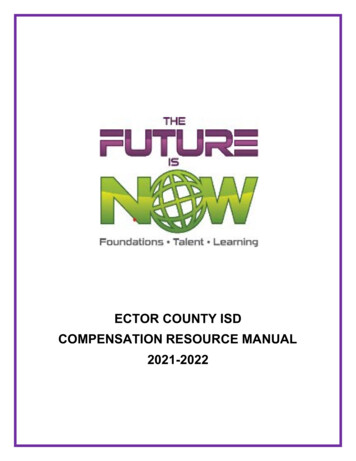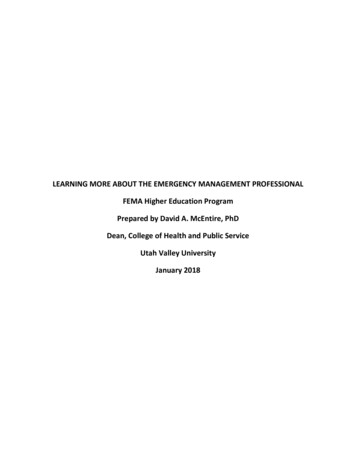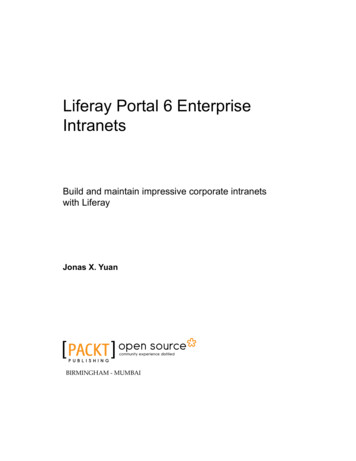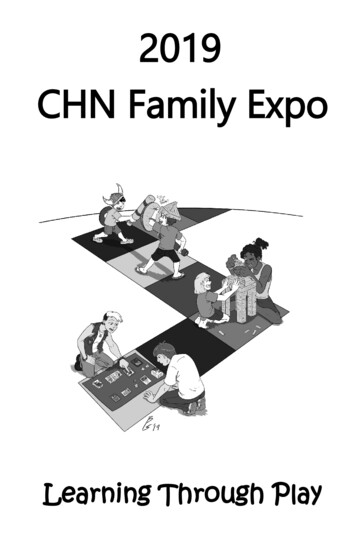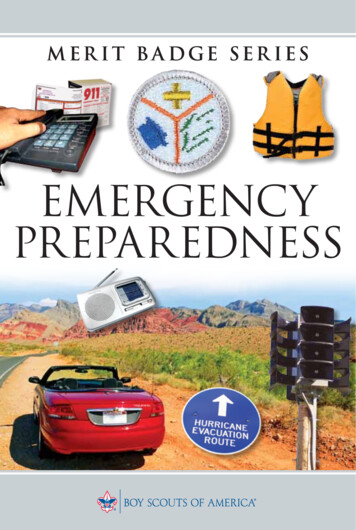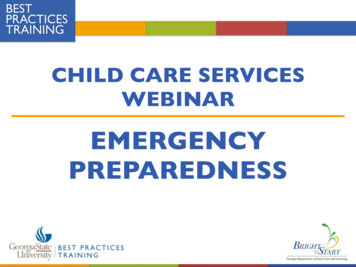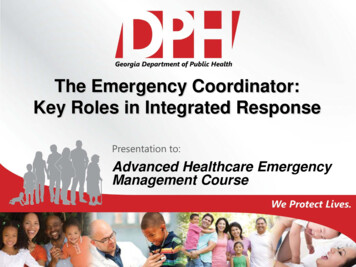
Transcription
The Emergency Coordinator:Key Roles in Integrated ResponsePresentation to:Advanced Healthcare EmergencyManagement Course
ObjectivesUpon lesson completion, you should be able to: Identify important roles of an Emergency Coordinator Recognize how the emergency coordinator can integratethe Emergency Management Program within the largercommunity response network Be able to name key partners essential to the makeup ofthe Emergency Management Committee Describe the main activities of the committee
A Healthcare Emergency Coordinator is: An individual dedicated to leading theorganization’s response to disasters Someone knowledgeable and skilledin emergency management A person with enormous responsibilitywho must work as part of a team
As an Emergency Coordinator,what are yourEmergency Managementresponsibilities Daily?andDuring an emergency?
Unit 6 Practical ActivityCritical Tasks of Emergency Coordinators
Advice toHealthcare Emergency CoordinatorsResearchers asked experiencedEmergency Program Managers this question:“What 2 or 3 most important pieces of advicewould you give?”They provided 12 themesas food for thought.Source: Emergency Management Principles and Practices for Healthcare Systems Unit 1
Advice toHealthcare Emergency Coordinators Meet and greet external agency heads Meet and greet executive leadership Establish personal credibility andcommitment Use past experience Research your community Ascertain the mission and the level of commitment to it Engage in consensus-building activities
Advice toHealthcare Emergency Coordinators Coordinate, do not control Increase public awareness and knowledge Establish media relationships Continue your own professionaldevelopment Establish a professional network Be tenacious
Leadership and InfluenceThe first responsibility of a leader is todefine reality. The last is to say thank you.In between, the leader is a servant.— Max DePreeYou don't lead by pointing and tellingpeople some place to go. You lead bygoing to that place and making a case.— Ken Kesey
Leadership and InfluenceI suppose leadership at one time meantmuscles; but today it means gettingalong with people.– Mohands K. GandhiThe key to successful leadership today isinfluence, not authority.– Kenneth Blanchard
Kid President: Be More Awesome
Gaining Buy-in and Support Know what you’re talking about – be able to explain whypreparedness process is so important and why they’re needed Invite key people – the decision makers Work your network & the six degrees of separation Tap into individuals’ intrinsic motivations Encourage backup meeting representatives foryour meeting and community partners’ Share planning meeting information internally andexternally as appropriate
Emergency Management Committee The Emergency Management Committee is amulti-disciplinary team that helps guide the focusof the Emergency Management Program– developing processes, policies and procedures, andsecuring necessary resources to ensure a prompt,coordinated and effective response May be Internal and External
Unit 6 Practical ActivityEmergency Management Program (EMP)and Committee
Job Duties and Responsibilities Support the implementation of, and training for,the Incident Command System (ICS)- ICS is essential for security, safety, andcommunications during training and disaster response Ensure all Emergency Management standardsand regulations are communicatedand met Support project management
Job Duties and Responsibilities Assist in the design, coordination, andimplementation of emergency preparednessplans, procedures, and training for both internaland external events Develop project plans andtimelines for accomplishingoutstanding tasks Lead the emergency managementcommittee and other related sub-committeemeetings
Job Duties and Responsibilities Depending on the size and resources available at anygiven facility, the emergency coordinator may have toserve multiple roles and participate with multiplecommittees Work with the Emergency Management Committeein preparing an annual report on the emergencymanagement program Present the report and program critiques tothe Safety and Executive Committees
Job Duties and Responsibilities Develop and maintain theEmergency Operations Plan (EOP) Ensure that an updated version of the plan isavailable and that the plan meets applicablelaws, regulations, and standards for yourhealthcare organization Investigate best practices with respect toemergency preparedness andincorporate them into the plan
lities(cont.) Coordinate and propose all capitaland significant operational requeststo support emergency preparedness Help design, develop, coordinate,and implement organization-wide andsite-specific training regarding the variouselements of theemergency managementprogram and the EOP
JobDutiesandResponsibilities(cont.)Job Duties and Responsibilities Ensure that the EmergencyManagement Call Lists areup to date and functional- Send out semi-annualreminders to updatedepartments' internal call lists- Drill on these call lists and publish updates Seek continual self-improvement- Attend seminars, obtain resource material forreview, and study best practices
lities(cont.) Coordinate and execute emergency preparednessexercises per year- Per Joint Commission standards, hospitals are requiredtwo, and one of the exercises must integrate acommunity response- Per HFR, Hospices must “rehearse DisasterPreparedness Plans at least quarterly”- For CHCs, the frequency and methods of testing andevaluation (table tops, drills, functional exercises, etc.)should be determined by the organization, but shouldbe at least on an annual basis.
lities(cont.) Convene a planning group for each drill Assist in the design of exercises and selection ofa scenario Develop After Actions Reports (AARs) andreview lessons learned Develop and oversee Improvement Plans (IP)based on AARs
Group Discussion Have you ever prepared an AAR?Does your organization use a template?What items are included?How are AARs acted upon?How are improvement plans developedand implemented ?
Successful Coordinator Skills Relevant education,certifications, orcourses Leadership skills andability to work underpressure Knowledge of and jobhistory involvingemergencymanagement Ability to makequick decisions Possess excellent writtenand oral communicationskills Strong interpersonalskills and team playercapabilities Computer skills Knowledge of facilities
Integration with Community Partners The emergency coordinator must share the plan withthe local emergency management agency perGeorgia HFR regulations He or she must work with local experts to ensure thatemergency preparedness equipment andsupplies are availableand functional Attend emergencypreparedness meetingswith external agenciesat the local, regional andstate levels
Integration with Community Partners Participate in localexercises Develop hazardvulnerability analysesin consultation withcommunity planningexperts
Emergency Management CommitteeGetting Started Define your team Partners – Internal – External Leading and relying on others:It’s not a paradox!
Emergency Management CommitteeRoles and Responsibilities Conduct an annual Hazard Vulnerability Analysis(HVA) Develop an “all-hazard” EOP and standardoperating procedures for particular identifiedhazards Develop and update annually a comprehensive“All-Hazards” emergency management program
EmergencyManagement CommitteeCommitteeEmergency bilities (cont.) Develop continuity of operations plans Ensure training of all employees and medicalstaff in their roles and responsibilities duringemergency response and recovery Attend to the mental health needs of respondersand victims Collaborate and coordinate planning andpreparedness with community response partners
Emergency Management CommitteeRoles and Responsibilities Educate administration and employees on theemergency management program and EOP Develop and carry out training and exercises- Internal drills, tabletops, and seminars for all employees- External exercises with community response partners
EmergencyManagement CommitteeCommitteeEmergency bilities (cont.) Report committee progress, challenges andsuccesses to:-Employees and medical staffChief Executive OfficerSenior administratorsHealthcare corporation officials
Emergency Management CommitteeConstituents: Internal All healthcare organizational departmentsshould be represented- Inclusion of key leaders,unit managers, and abalanced representationof operational andsupporting units in theHealthcare Organization(HCO) is essential
Emergency Management CommitteeConstituents: External Emergency management committee should alsoinclude external response partners:-Law enforcementFire and Emergency Medical ServicesEmergency managementPublic HealthOther key community response partners
Emergency Management CommitteeMain Goals: HVA Review Committee is responsible for conducting anannual Hazard Vulnerability Analysis (HVA)- HVA is a key element of the EOP A major planning tool for incident-specificplanning, the HVA:- Identifies, prioritizes and defines threats that mayimpact business and patient care operations- Offers specific steps to reduce the impact of anuntoward event- Ensures continuity of business functions
Emergency Coordinator & Committee:Bottom Line in the 4 Phases of EMSupport the healthcare organization’s businesscontinuity plans in the following ways:Mitigation . Prevention StrategiesPreparedness . Individual, Departmental, andOrganizationalResponse . Internal and ExternalResponseRecovery . Plan for it in detail
AdvancedHealthcare Emergency Management CourseQuestions?
The Emergency Management Committee is a multi-disciplinary team that helps guide the focus of the Emergency Management Program - developing processes, policies and procedures, and securing necessary resources to ensure a prompt, coordinated and effective response May be Internal and External Emergency Management Committee


